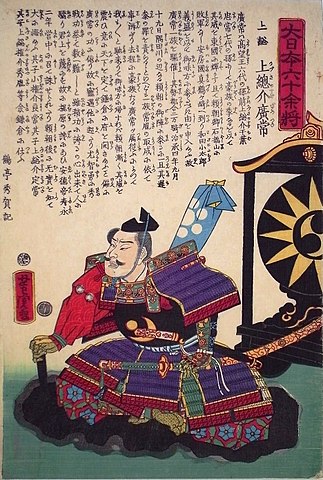After finishing the Japanese historical drama, The Thirteen Lords of the Shogun,1 I managed to buy the Blu-ray from Amazon JP before it was taken off shelves due to controversy with one of the actors. Lately, as life has finally calmed down a little, I have been watching it again. With the benefit of rewatching, and Japanese subtitles, I have picked up a lot more from the show including this tragic bit of history.
One of the climatic turnings points early in the drama is Minamoto no Yoritomo’s execution of one of his vassals, Kazusa Hirotsune in front of everyone. Hirotsune was made the scapegoat for a failed rebellion among local retainers, while the rebellion was appeased, Yoritomo had him killed to teach a lesson. Hirotsune’s innocence was only confirmed after his death.
Apparently, some version of this really happened.

According to the end of the episode, the incident was recorded in a historical record called the Gukanshō (愚管抄). In that document, it states that Hirotsune was a big player of a dice game called Sugoroku and while he was playing with some other vassals, he was suddenly attacked and slain by another vassal, Kajiwa Kagetoki, on Yoritomo’s orders. Later, Kagetoki, was said to have purified and washed the blood off his sword at the waters of a holy spring nearby. Hirotsune was evidentially abrasive and butted heads with Yoritomo at times, but nonetheless he was innocent of provoking the rebellion. Nonetheless, the damage was done: the clan property was broken up and given to other vassals for their loyalty, and the Kazusa clan disappeared from history.
Eight hundred years later the lands of the Kazusa family are now part of a local orchard in Kanagawa Prefecture, Japan called the Juniso Kajuen (十二所果樹園). You can see it on Instagram here. It’s a very nice looking orchard, but visitors walking through that orchard would probably never guess that long ago this was once the domain of a powerful and influential warlord.
I guess what I find fascinating and tragic about all this is how someone powerful and wealthy can be struck down, possibly through no fault of their own, and with the passage of centuries very little trace of their legacy remains.
1 not to be confused with the American series “Shogun”. The “Thirteen Lords” series was for Japanese TV only, and based on an entirely different historical event. Sadly, there is no English subtitles available which is a shame because I would argue that Thirteen Lords of the Shogun is a really fine drama and would be a huge hit overseas.
Discover more from Gleanings in Buddha-Fields
Subscribe to get the latest posts sent to your email.